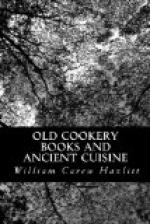Soyer had also perhaps certain misgivings touching too close an approximation to other chefs besides Milton and Shakespeare, for he refers to the “profound ideas” of Locke, to which he was introduced, to his vast discomfort, “in a most superb library in the midst of a splendid baronial hall.” But the library of the Reform Club probably contained all this heterogeneous learning. Does the “Gastronomic Regenerator,” out of respect to the fastidious sentiments of its author, occupy a separate apartment in that institution with a separate curator?
It seems only the other day to me, that Soyer took Gore Lodge, and seemed in a fair way to make his removal from the Reform Club a prosperous venture. But he lost his wife, and was unfortunate in other ways, and the end was very sad indeed. “Soyez tranquille,” was the epitaph proposed at the time by some unsentimental wagforpoor Madame Soyer; it soon served for them both.
But nearly concurrent with Soyer’s book appeared one of humble pretensions, yet remarkable for its lucidity and precision, Eliza Acton’s “Modern Cookery in all its Branches reduced to an easy practice,” 16mo, 1845. I have heard this little volume highly commended by competent judges as exactly what it professes to be; and the quantities in the receipts are particularly reliable.
The first essay to bring into favourable notice the produce of Colonial cattle was, so far as I can collect, a volume published in 1872, and called “Receipts for Cooking Australian Meat, with Directions for preparing Sauces suitable for the same.” This still remains a vexed question; but the consumption of the meat is undoubtedly on the increase, and will continue to be, till the population of Australasia equalises supply and demand.
COOKERY BOOKS.
PART IV.
Besides the authorities for this branch of the inquiry already cited, there are a few others, which it may assist the student to set down herewith:—
1. A Collection of Ordinances and Regulations for the Government of the Royal Household (Edward III. to William and Mary). 4to, 1790.
2. The book of Nurture. By Hugh Rhodes, of the King’s Chapel. Printed in the time of Henry VIII. by John Redman. 4to.
3. A Breviate touching the Order and Government of the House of a Nobleman. 1605. Archaeologia, xiii.




